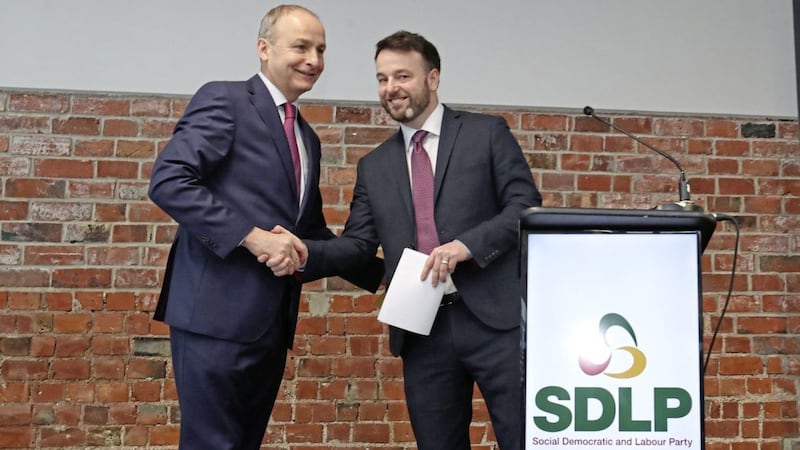THE problem for the SDLP is that Colum Eastwood's leadership hasn't actually delivered anything so far.
Mark Durkan, Margaret Ritchie and Alasdair McDonnell have lost their Westminster seats. The MLA tally has gone down from 14 to 11.
In McDonnell's last three elections as leader, the SDLP averaged 88,190 votes (13.5 per cent) to Sinn Féin's 162,394 (25 per cent).
Eastwood's first three elections have seen those figures shift to 91,580 (12 per cent) and 210,000 (27 per cent).
In fairness to Eastwood, he couldn't have predicted that his leadership would coincide with Brexit and the most toxic relationship between unionism and nationalism in almost 30 years.
That said, he has singularly failed to attract any significant support from the upturn in the overall nationalist vote.
So it made sense for him to focus on a strategy which would, at the very least, make the SDLP look electorally relevant again.
More than that, at a time when Irish unity is at the top of the political agenda for nationalists in Northern Ireland - with some evidence suggesting their concerns over a 'hard' Brexit and an 'intransigent and anti-everything-Irish' DUP are pushing them beyond support for a rebooted Assembly - it also made sense for Eastwood to construct a challenge to Sinn Féin's position as the only 'all-island' electoral/political vehicle.
Micheál Martin has toyed with the idea of Fianna Fáil having a presence in Northern Ireland for some time and told me in an interview a few years ago that he was looking at the 2019 local council elections as an "opportunity".
So it didn't come as a surprise when, late last summer, it was reported that both parties were having talks about a possible merger, relationship or partnership - the description changed depending on whom you were phoning.
Fighting elections separately would have divided the nationalist vote to both SF's and the DUP's advantage; an early merger would have spooked the grassroots on both sides; so most observers assumed that Martin and Eastwood would test the water with a formal electoral pact.
But what they seem to have ended up with is the electoral equivalent of going to the prom with your first cousin.
The SDLP will field the candidates and Fianna Fáil members and representatives - most of whom won't be recognised by those voters who could actually be bothered answering their door when it is knocked during the campaign - will stand beside them and smile.
They'll probably also be shuffling nervously and taking great interest in the lawn, absolutely terrified of being asked a question and giving a hostage to fortune.
And because the 'partnership' is so loose and flimsy - it's never advisable, of course, to be overly intimate with your first cousin - both leaders will be dogged by 'what's it all about' questions between now and polling day: probably followed by 'what was the point of all that' questions when the results start coming in.
Eastwood sets great store by the 'emphatic' 70-30 margin of victory for the deal last Saturday - the same margin of victory David Trimble had when he asked the Ulster Unionist Council to endorse the Good Friday Agreement.
But he's already lost Claire Hanna and a handful of other members and office holders.
More will follow. Some will write letters or press statements announcing their resignations; most, particularly core voters, will simply drift away.
And if there isn't very significant evidence of an electoral breakthrough on May 2 - just 76 days away - then Eastwood will have huge internal problems.
Former UUP leader Reg Empey took quite a few risks with the UUP/Conservative (Ucunf) electoral pact in late 2008; but when it didn't deliver in the 2010 general election he was eased out of the leadership and the pact just collapsed.
It's maybe worth noting that the deal was unanimously endorsed by the UUP's executive; and also worth noting that Lady Hermon MP resigned from the party and held her seat.
The other immediate difficulty for the SDLP/FF partnership is that the local council election will be, in effect, an unofficial referendum about a border poll.
Sinn Féin will want to maximise its vote - it's determined to nudge past the DUP as the largest party - hoping to boost the argument in favour of a border poll.
And the DUP will want to counter that move by encouraging a huge turnout from the entire pro-Union family: 'Send out the message to republicans that the Union still enjoys the support of a clear majority in Northern Ireland.'
In that sort of battle it will be difficult for the SDLP/FF vehicle to get much traction.
A few months ago it looked as though Eastwood and Martin were serious about making a difference and mounting a credible challenge to Sinn Féin.
So maybe they just lost their nerve, or maybe they looked at the numbers and prevailing circumstances and 'caught themselves on'.
Either way, they're offering nothing new or particularly relevant. For Eastwood, the deal may already have cost his party 30 per cent of its vote.







